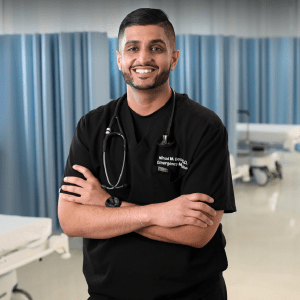This article has been provided by St. George’s University, School of Medicine in Grenada, West Indies
Dr. Ninad Desai, an emergency medicine resident physician, and graduate of St. George’s University, Grenada
Most future physicians—no matter how long they’ve intended to pursue a medical degree—spend at least some time thinking about what their future careers might entail. It’s common to wonder, “What type of doctor should I be?” Because there is a multitude of medical specialties out there, it can be difficult to decide. This is why going through a residency program and exploring the different specialties can bring aspiring doctors closer to their passions.
Each specialty requires that the physician would have specific personality traits. Knowing what these qualities are might give you some visibility into the physician’s responsibilities.
How to decide what kind of doctor to be: exploring careers and characteristics
Aspiring physicians should consider not only how their inherent traits align with each of the roles below but also the day-to-day tasks each role involves. It’s also wise to consider attending virtual events that can provide further information on different specialties.
You know you’re destined to pursue a career in medicine, but what type of doctor you are meant to be? With so many specialties out there, it can be difficult to decide on which path to follow. The truth is that some people are better suited that others to practice in particular areas.
So, where might you make the most impact? browse this list of specialties to learn a bit about what each doctor does and determine if you have the inherent qualities needed to succeed.
-
ANESTHESIOLOGIST
Anesthesiologists are heavily involved in preoperative care to determine the safest plan for individual patients and follow up regularly after the procedures is completed. They administer anesthesia during operations and for other cases where it may be needed to alleviate pain or discomfort. The best anesthesiologists are focused, calm under pressure and able to assess risk.
-
CARDIOLOGISTS
Cardiologists handle cardiovascular and blood vessel health. They treat heart conditions, such as heart attacks and high blood pressure, but they also focus a lot of their efforts of preventive care. The most successful cardiologists have good communication skills, are natural educators and excellent planners.
-
EMERGENCY MEDICINE PHYSICIAN
Emergency medicine physicians typically work in hospital emergency rooms or urgent care clinics, treating patients with variety of critical conditions. they never know what’s going to come through their doors, so they need to be ready for everything from a child with stomach bug to an adult with a life-threatening injury. Emergency medicine physicians should be decisive, able to remain calm under pressure and manage their time efficiently. “Emergency physicians always need to have a fine level of composure,” says Dr. Ninad Desai, an emergency medicine resident physician, and graduate of St. George’s University, Grenada, “we need to be able to compartmentalize different tasks and information and prioritize accordingly.”
-
INTERNIST/FAMILY MEDICINE
Internists are at the forefront of primary care, establishing long-term relationships with their patients. They work exclusively with adults and treat a wide variety of both common and complex issues. Therefore, internists need to be personable, attentive, and curious. In 2020, family medicine made up 22% of the St. George’s University residency placements.
-
NEUROLOGIST
Not to be confused with neurosurgeons, neurologists treat conditions of the brain, spinal cord, and nerves. They see many types of patients, including those who have dementia, seizure disorders, and Parkinson’s disease. Qualities that every successful neurologist should have include being natural problem solvers, curious and patient.
-
OB/GYN
Short for obstetrician/gynecologist, an OB/GYN is a women’s health specialist who helps in all aspects of reproductive health, pregnancy, and birth. Many women also rely on their OB/GYN as a primary care physician. Hence why doctors who specialize in this field need to be respectful, trustworthy and have a flexible mindset.
-
PATHOLOGIST
Pathology is technically the study of disease, but that barely scratches the surface of what pathologists do. They examine tissue samples, analyze individual cells to make diagnoses, and perform autopsies, much of their job entails lab work. The best pathologists are collaborative, straightforward and are good oral and written communicators.
-
PEDIATRICIAN
Children rely on pediatricians to address their health needs. Parents see their child’s pediatrician pretty frequently during their first few years but visits typically shift to an annual check-up once a child is older than 5. Some pediatricians continue to provide care for their patients all the way through college. Such a profession requires a personality that is extroverted, flexible and skilled at supervision.
-
PSYCHIATRIST
Psychiatrists support mental health and are qualified to assess both physical and psychological issues. They can prescribe medications, but also rely on other treatments like psychotherapy to treat their patients. The main qualities of a good psychiatrist include being respectful, intuitive, empathetic, and socially perceptive.
-
SURGEON
While there are many surgical specialties, many opt to pursue general surgery, these doctors treat diseases and injuries using surgical methods that may or may not require anesthesia. Such a profession requires the doctors to an extroverted personality with critical qualities such as being cautious and, meticulous.
Ultimately, experiencing these specialties will be the deciding factor for aspiring doctors. Students in their final two years of medical school at St. George’s University will experience core rotations in internal medicine, pediatrics, surgery, obstetrics/gynecology, and psychiatry, which helps students become familiar with the skills and mindset to excel in these specialties. These clinical rotations can be completed at one of over 70 affiliated hospitals in the US and UK. The different healthcare systems provide a unique perspective on the variety of environments students will experience during their careers in medicine.













